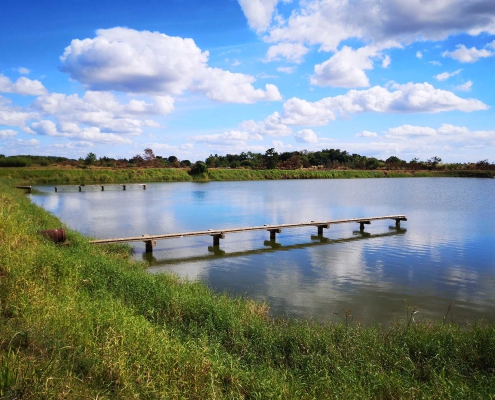Environment and climate change
Integrated Water Resources Management approach as one of the keys to efficient and sustainable water management
Integrated Water Resources Management approach as one of the keys to efficient and sustainable water management

Most of the Water Fund programs incorporate the Integrated Water Resources Management approach as one of the keys to efficient and sustainable water management. This means taking into account their interaction with the territory and, especially, with the environment. For this reason, the Fund works on creating sustainable infrastructure and environmental measures to protect sources and ecosystems associated with water resources. On the other hand, developing sanitation and wastewater treatment systems has an immediate impact on protecting the water environment and preserving water bodies and aquatic ecosystems.
The Fund also impacts institutional strengthening programs and activities to improve the sector’s governance, essential to achieve adequate water resource management that integrates and mainstreams environmental protection.
All of the Fund’s initiatives work to improve adaptation to climate change, incorporating measures to increase the resilience of communities to extreme weather events, such as droughts and floods. Thus, some programs are mainly focused on creating warning systems and response plans for exceptional situations, allowing for the anticipation of these events and favoring the adaptation of communities to climate change. Other programs have adopted measures to recover flood plains, minimizing the risk of affecting populations and the environment while maintaining the natural dynamics of river courses. In addition, many forestry management and reforestation actions have been carried out, which allows us to maintain proper forest and wetland management and helps to increase the groundwater recharge rate. This type of intervention, developed mainly in the most vulnerable areas of rural areas, also favors the fixation of the population to the territory.
Since 2013, one of the flagship programs of the Cooperation Fund for Water and Sanitation has been underway. The initiative aims to Promote adaptation to climate change and integrated management of water resources in the water and sanitation sector in Latin America financed with resources from the European Union and a regional project. Among other activities, projects have been carried out to strengthen hydroclimatic services in various countries, analyze the heat wave in Central America, create the Regional Lightning Detection Network for Central America, analyze climate scenarios, manage extreme events, develop water security plans and create a Groundwater Monitoring Platform for Latin America. A multidimensional effort to support the possibilities of adaptation to climate change of the most vulnerable populations.
El Fondo de Cooperación para Agua y Saneamiento pone especial atención en el aspecto medioambiental en sus programas, reforzando la Gestión Integrada de los Recursos Hídricos (GIRH) en todas sus intervenciones.
The Spanish Cooperation indicates Nature-Based Solutions (NBS) as one of the priorities to fight climate change and support biodiversity. The European Union also emphasizes this approach, which defines them as solutions «inspired and supported by nature, that are cost-effective, provide environmental, social and economic benefits, and help increase resilience.» In the case of water and sanitation, we are talking about solutions that use or mimic natural processes to contribute to the more efficient management of water resources, whether in rainwater harvesting, drinking water treatment, or purification processes.
Therefore, based on the Fund’s Integrated Water Resources Management (IWRM) approach, the programs have incorporated this type of solution in their proposals to promote sustainable infrastructures and support the protection of water sources and ecosystems associated with water resources.